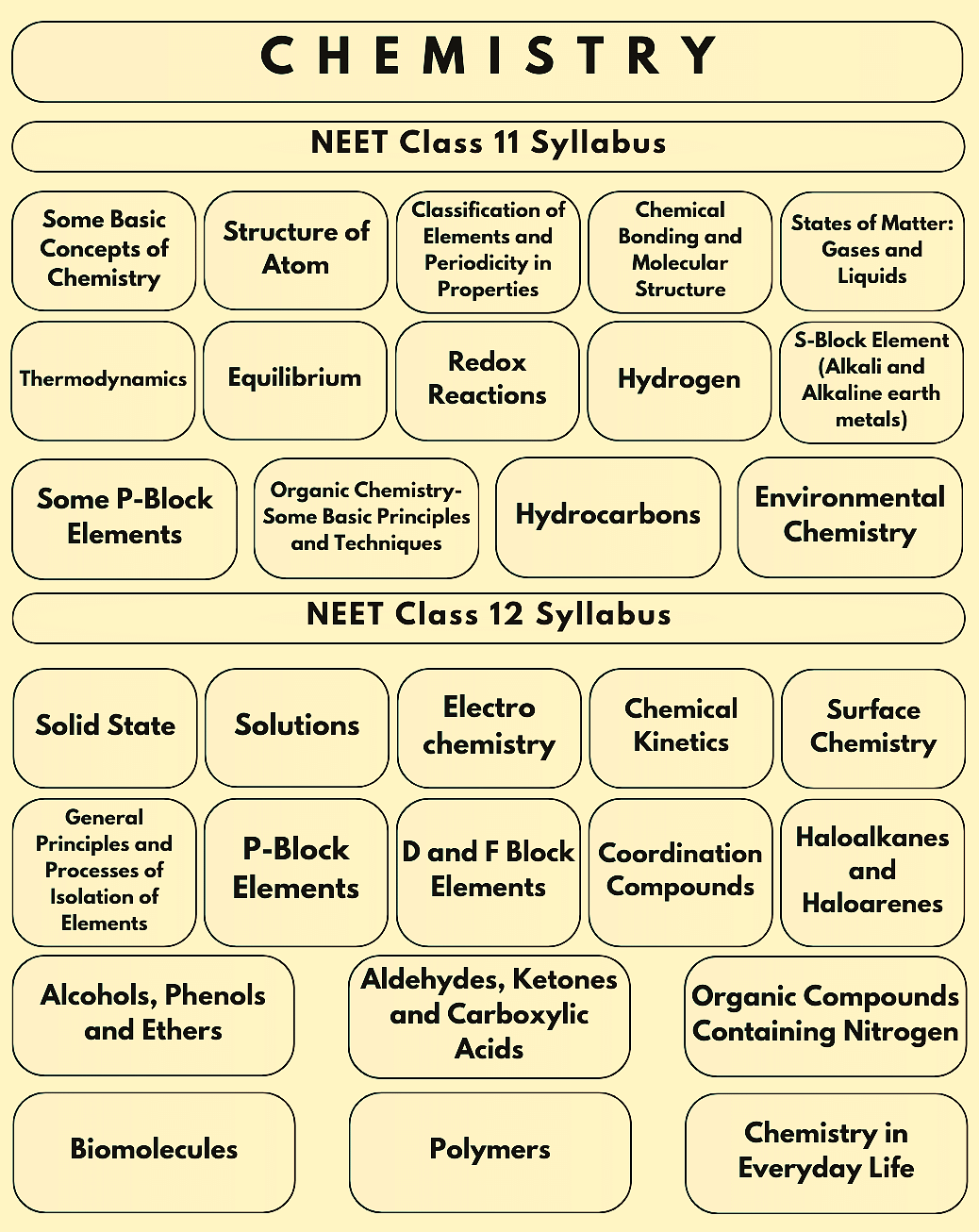1 | Some Basic Concepts in Chemistry | Matter and its nature, Dalton's atomic theory: Concept of atom, molecule, element, and compound; Laws of chemical combination; Atomic and molecular masses, mole concept, molar mass, percentage composition, empirical and molecular formulae: Chemical equations and stoichiometry |
2 | Atomic Structure | Nature of electromagnetic radiation, photoelectric effect; Spectrum of the hydrogen atom. Bohr model of a hydrogen atom - its postulates, derivation of the relations for the energy of the electron and radii of the different orbits, limitations of Bohr's model; Dual nature of matter, de Broglie's Relationship, Heisenberg uncertainty principle, Elementary ideas of quantum mechanics, quantum mechanics, the quantum mechanical model of the atom, its important features. Concept of atomic orbitals as one-electron wave functions: Variation of Y and Y2 with r for ls and 2s orbitals. Quantum numbers (principal, angular momentum, and magnetic quantum numbers) and their significance; shapes of s, p, and d - orbitals, electron spin and spin quantum number: Rules for filling electrons in orbits - Aufbau principle. Pauli's exclusion principle and Hund's rule, electronic configuration of elements, and extra stability of half-filled and completely filled orbitals. |
3 | Chemical Bonding and Molecular Structure | Kossel - Lewis approach to chemical bond formation, the concept of ionic and covalent bonds. Ionic Bonding: Formation of ionic bonds, factors affecting the formation of ionic bonds; calculation of lattice enthalpy. Covalent Bonding: Concept of electronegativity, Fajan's rule, dipole moment: Valence Shell Electron Pair Repulsion (VSEPR) theory and shapes of simple molecules. Quantum mechanical approach to covalent bonding: Valence bond theory - its important features, the concept of hybridization involving s, p, and d orbitals; Resonance. Molecular Orbital Theory: Its important features. LCAOs, types of molecular orbitals, (bonding, antibonding), sigma and pi-bonds, molecular orbital electronic configurations of homonuclear diatomic molecules, the concept of bond order, bond length, and bond energy. Elementary idea of metallic Bonding. Hydrogen Bonding And its Applications. |
4 | Chemical Thermodynamics | Fundamentals of thermodynamics: system and surroundings, extensive and intensive properties' state functions, types of processes. First law of Thermodynamics: Concept of work, heat internal energy and enthalpy, heat capacity, molar heat capacity; Hess’s law of constant heat summation; Enthalpies of bond dissociation, combustion, formation, atomization, sublimation, phase transition, hydration, ionization, and solutions Second Law of Thermodynamics: Spontaneity of processes: ΔS of the universe and ΔC of the system as criteria for spontaneity. ΔG° (Standard' Gibbs energy change) and equilibrium constant. |
5 | Solutions | Different methods for expressing the concentration of solution - molality, molarity, mole fraction, percentage (by volume and mass both), the vapor pressure of solutions and Raoult’s law - Ideal and non-ideal solutions, vapor pressure - composition, plots for ideal and non-ideal solutions: colligative properties of dilute solutions - a relative lowering of vapor pressure, depression or mass freezing point, the elevation of boiling point and osmotic pressure; Determination of molecular mass using colligative properties; abnormal value of molar mass, Van’t Hoff Factor and its Significance.Meaning of equilibrium, the concept of dynamic equilibrium. |
6 | Equilibrium | Meaning of equilibrium, the concept of dynamic equilibrium. Equilibria involving physical processes: Solid-Liquid-, Liquid-gas and solid-gas equilibria, Henry’s Law. General Characteristics of Equilibrium involving physical processes. Equilibrium Involving Chemical Processes: Law of chemical equilibrium, equilibrium constants (Kp and Kc) and their significance, the significance of ΔG and ΔG° in chemical equilibrium, factors affecting equilibrium concentration, pressure, temperature, effect of catalyst; Le Chatelier’s principle. Ionic Equilibrium: Weak and Strong Electrolytes, ionization of electrolytes, various concepts of acids and bases (Arrhenius Bronsted - Lowry and Lewis) and their ionization, acid-base equilibria (including multistage ionization and ionization constants, ionization constants, ionization of water. pH scale, common ion effect, hydrolysis of salts and pH of their solutions, the solutions, the solubility of sparingly soluble salts and solubility products, and buffer solutions. |
7 | Redox Reaction and ElectroChemistry | Electronic Concepts of Oxidation and Reduction, Redox Reaction, Oxidation Number, Rules for assigning oxidation number, balancing of redox reaction. Electrolytic and metallic conduction, conductance in electrolytes solutions, molar conductivities and their variation with concentration: Kohlrausch’s law and its applications. Electrochemical Cells: Electrolytic and Galvanic cells, Different types of electrodes, electrode potentials including standard electrode potential, half - cell and cell reactions, emf of a galvanic cell and its measurement: Nernst equation and its applications, Relationship between cell potential and Gibbs’ energy change: Dry cell and lead accumulator; Fuel cells. |
8 | Chemical Kinetics | Rate of a chemical reaction, factors affecting the rate of reactions: concentration, pressure, temperature and catalyst; elementary and complex reactions, order and molecularity of reactions, rate law and rate constant and its units, differential and integral forms of zero and first-order reactions, their characteristics and half-lives, and the effect of temperature on the rate of reactions. Arrhenius theory, activation energy and its calculation, collision theory of bimolecular gaseous reactions (no derivation). |














